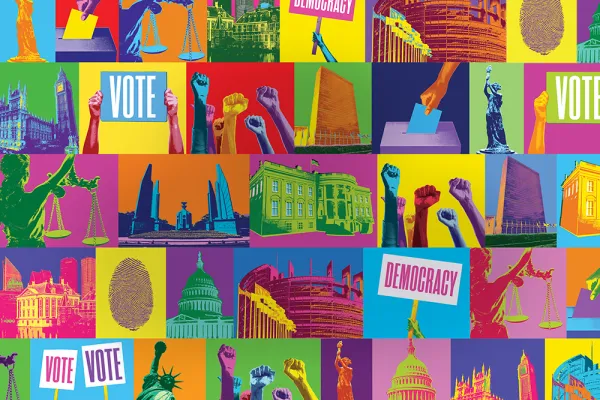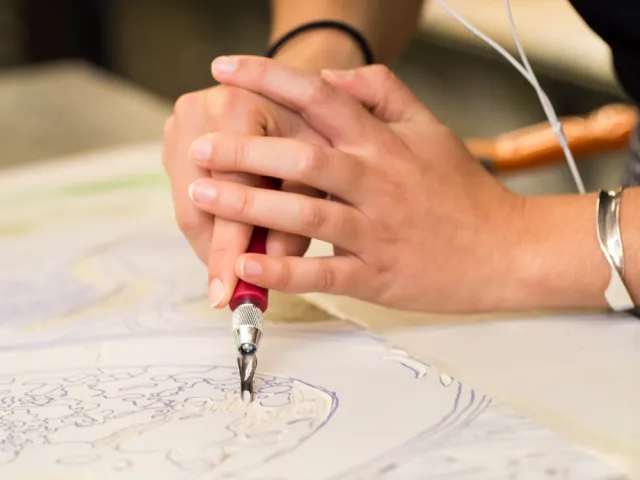Democracies Through the Lens of the Liberal Arts
Smith Quarterly
Campus-wide, yearlong theme examines historical, philosophical, and global aspects of democracy
Published August 31, 2021
With presidential colloquia by influential thought leaders, as well as lectures on the fight for racial justice and art exhibitions on America’s political landscape, the college’s Year on Democracies initiative promises a comprehensive exploration of what President Kathleen McCartney called “notions of democracy around the world.”
“The Year on Democracies is an important and visible way that Smith will focus its curricular and co-curricular resources on questions that lie at the heart of the liberal arts,” McCartney said in a message to the campus. “Examining what we mean by ‘democracies’ has never seemed more compelling nor more urgent.”
Events of the past year, both in the United States and abroad, point to the need for a deep intellectual dive into the global and historical aspects of democracy, according to Alex Keller, professor of film and media studies and director of the Kahn Liberal Arts Institute, one of several campus partners helping to organize the program. “If ever there was a moment to think and reflect together about democracy—the idea, as well as the governmental, organizational, philosophical, and ethical concept—it is now,” she said. “Democracies, and democratic ways of thinking, have revealed themselves to be as fragile as they are robust, a fact that is true well beyond the United States.”
The idea for the democracies initiative has its roots in the college’s successful Year on Climate Change, said Keller. “I saw how the Year on Climate Change had been so generative,” she said, “and though climate change is the single biggest issue of our age, the fragility of democracy worldwide is next—and, in some ways, is inextricably linked with getting a handle on climate change.”
To facilitate the development of democracy-related courses, programs, and events, President McCartney allocated nearly $100,000 in Innovation Grants with the goal of inspiring faculty, students, and staff to explore the topic “through the lens of every aspect of the college’s offerings.” So far, more than 50 courses in disciplines across the curriculum—including art history, woodcut printmaking, engineering and computer science—are focusing on various aspects of democracy. As part of another presidential initiative, Humanities and Social Sciences Labs, Keller started a democracies lab in which students conducted research into what student involvement might look like. Networks among student and other organizations on campus have developed to generate student-led programming. This work will continue through the academic year, Keller said.
“Woodcut Printmaking” is one of the courses associated with the Year on Democracies.
Keller notes the long history of activism and community engagement at Smith and considers the Year on Democracies to be another way of including as many constituents as possible. The intent, she said, is not to sound democracy’s death knell, nor to assume its perfectability, but rather “to look at how we can really make it true and real for everybody—not just at the voting booth but as a daily life practice.”
The Year on Democracies had a soft launch in the spring, but officially kicked off on September 8 with a presidential colloquium featuring Nancy Pelosi, speaker of the U.S. House of Representatives. “It was a fantastic way to start,” said Keller. Student projects are also in the works. More events will be added as the year progresses, including those in which alumnae can participate.
“Making sure that people are involved in ways that make sense to them is very important,” Keller said. “We want everybody to feel like there is something there that matters to them.”
EXPLORING DEMOCRACY
A sampling of events, exhibits, and projects related to Smith’s Year on Democracies.
Events
- September 8: Presidential Colloquium, Nancy Pelosi, Speaker of the House of Representatives
- September 16: Presidential Colloquium, Carol Jenkins, Co-president and CEO of The ERA Coalition and the Fund for Women’s Equality
- November 4: Cromwell Day, Collective Imagining of Antiracist Democracies: Fighting for Racial Justice
- November 16: Presidential Colloquium, Maria Hinojosa, award-winning journalist and founder of the Futuro Media Group
Kahn Institute Projects
- Coping with Democratic Precarity and the Prospects for Democratic Renewal
Organizing Fellows: Steven Heydemann, Middle East Studies, and Andrew Zimbalist, Economics - Democracies Redux: Resumptions, Resilience, Reconciliation, and Restoration
Organizing Fellows: Sujane Wu, East Asian Languages and Cultures, and Payal Banerjee, Sociology
Exhibits
- Whitman, Alabama
Jennifer Chang Crandall reimagines Walt Whitman’s “Song of Myself.” Crandell traveled the American South for several years filming individuals of all walks of life reciting several lines of the epic poem. The result is a series of videos that create a tapestry of what America life that illustrates values and beliefs that are more united than divided. The videos will run at the Smith College Museum of Art, as well as other spots on campus. Crandall will also be this year’s Lakes writer-in-residence and hopes to engage in many conversations on campus about democracy and its complexities. - Lessons of the Hour
Opens on Dec. 7, 2021
This meditative film portrait of Frederick Douglass (1818–1895) by British filmmaker and installation artist Isaac Julien touches on all aspects of Douglass’ life—as a slave, famed abolitionist, and elder statesperson battling racism—through Douglass’ own words. “Lessons of the Hour addresses the fundamental crises and debates of the 19th century, from chattel slavery and lynching to the new forms of self-making and representation enabled by photography, and their many contemporary resonances,” says Emma Chubb, Charlotte Feng Ford ’83 Curator of Contemporary Art at the Smith College Museum of Art. Some of Douglass’ most important speeches form the foundation of the film, including 1861’s “Lecture on Pictures,” in which Douglass—the most photographed American of the 19th century—explained how he saw the burgeoning technology of photography as a powerful tool in the fight for equality. Douglass’ words are also juxtaposed with film of present-day unrest to illuminate the ongoing challenges our country has faced. “It is important to understand the history of how we got here,” says Chubb. “Lessons of the Hour offers such an invitation.” The installation is tentatively scheduled to open in late 2021. It will be shown in SCMA’s video and new media gallery. “Lessons of the Hour holds immediate relevance for interdisciplinary teaching and learning at Smith,” says Chubb. “Douglass would likely recognize in today’s United States the forms of racism and violence that he condemned more than a century ago.”

